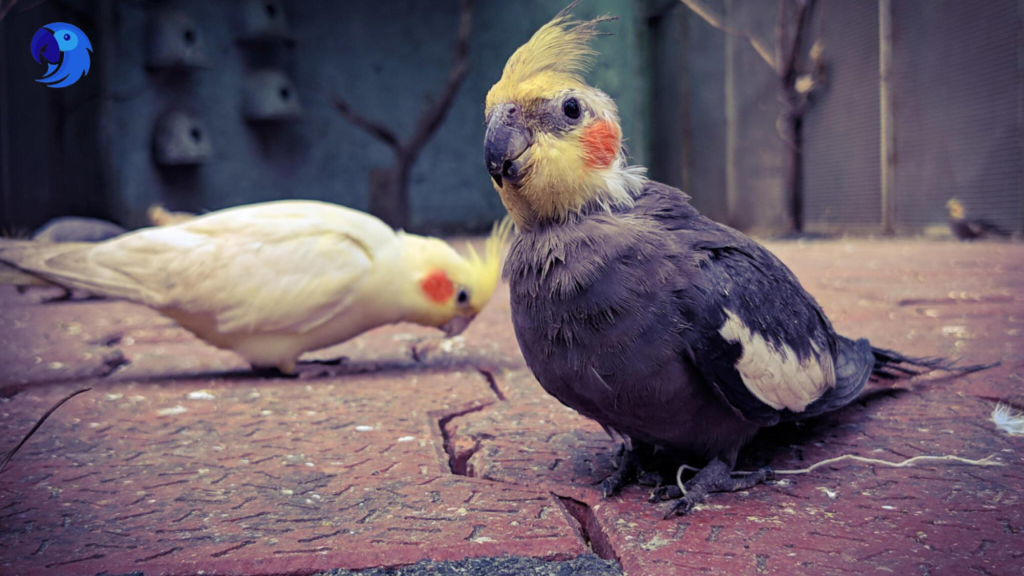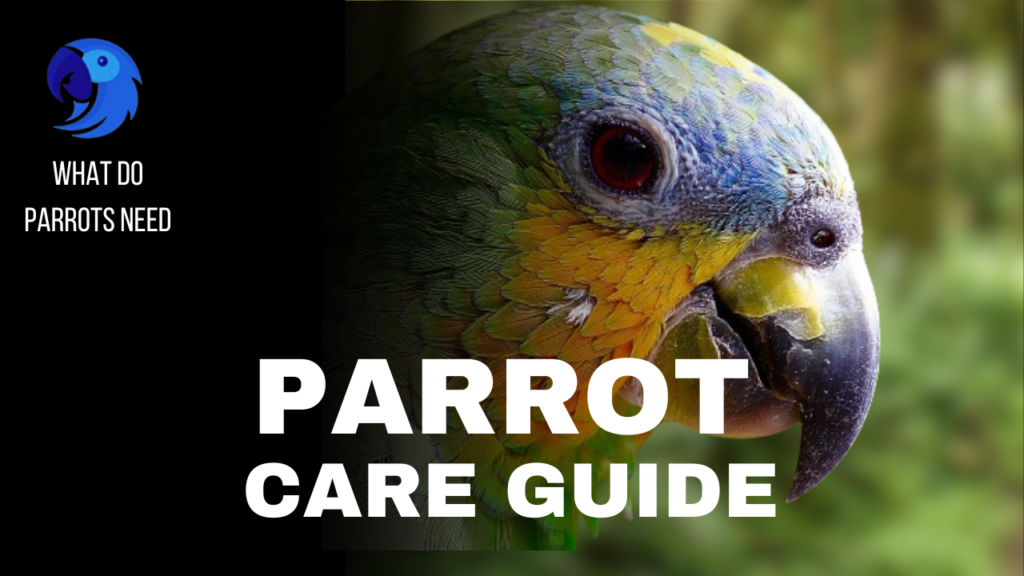Parrot Care Guide

Photo by tommileew on Pixabay
Introduction
Are you thinking of having a pet parrot but don’t know where to start? Look no further! This detailed “Parrot Care Guide” will give you all of the information you need to make sure your feathered companion receives the finest possible care. We’ll cover all you need to know about diet, habitat, and health maintenance.
Proper nutrition is critical for your parrot’s health, so we’ll go over the dos and don’ts of parrot diets. Understanding your parrot’s individual nutritional demands can not only help them stay healthy but will also improve their general contentment.
Creating a suitable habitat is another vital aspect of parrot care, and our guide will provide you with expert insights on how to set up the perfect environment for your feathered companion. We’ll cover everything from cage size and location to perches and toys that will keep your parrot entertained and stimulated.
Additionally, ensuring your parrot’s good health is essential, and our guide will equip you with the knowledge to identify common health issues and provide proper care. Regular check-ups, grooming, and exercise are all essential components of maintaining your parrot’s well-being.
Whether you’re a new parrot owner or looking to enhance your current parrot care knowledge, this guide has got you covered. Get ready to embark on an exciting journey of parrot ownership with our “Parrot Care Guide.”
Choosing the right parrot species for you
Choosing the right parrot species is the first step in providing the best care for your feathered friend. Each parrot species has its own unique characteristics and requirements. Some parrots are more talkative, while others are more colorful or have specific dietary needs. Consider your lifestyle, living situation, and the level of commitment you can provide before making your choice. Research different parrot species and consult with reputable breeders or avian experts to find the perfect match for you and your family.
When choosing a parrot, keep in mind their lifespan. Parrots are long-lived birds, and some species can live for several decades. Make sure you are prepared for the long-term commitment and can provide a stable and nurturing environment for your parrot throughout their life.
Once you have chosen the right parrot species for you, it’s time to create a suitable habitat for your new feathered companion.
Creating a suitable habitat for your parrot
Creating a suitable habitat is crucial for your parrot’s well-being. A well-designed and spacious cage is essential, providing your parrot with a comfortable and secure living space. The cage should be large enough for your parrot to spread its wings and move around without any restrictions. A general guideline is to choose a cage that is at least twice the wingspan of your parrot.
When selecting a location for the cage, choose an area that is well-lit and away from drafts, direct sunlight, and excessive noise. Parrots are social creatures and enjoy being part of the family, so place the cage in a central area where your parrot can interact with you and observe the household activities.
Inside the cage, provide a variety of perches made from different materials such as wood, rope, and natural branches. This will help keep your parrot’s feet healthy and prevent any foot problems. Additionally, offers a selection of toys and puzzles to keep your parrot mentally stimulated and entertained.
Remember to clean the cage regularly to maintain a hygienic environment for your parrot. Remove any droppings, or uneaten food, and replace soiled bedding. A clean cage helps prevent the spread of diseases and ensures your parrot stays healthy and happy.
Feeding and diet tips for parrots
Proper nutrition is vital for the overall health and longevity of your parrot. A well-balanced diet should include a variety of fresh fruits, vegetables, grains, and protein sources. Avoid feeding your parrot foods that are high in fat, salt, or sugar, as these can lead to health problems such as obesity and cardiovascular issues.
Fresh water should be available at all times, and it’s important to change it daily to prevent the growth of bacteria. Offer your parrot a mix of pelleted food and fresh produce. Pellets provide essential vitamins and minerals, while fruits and vegetables offer additional nutrients and hydration.
Parrots can be fussy eaters, so introduce new foods gradually. Monitor their reactions to various meals and adapt their diet accordingly. Consult an avian veterinarian or nutritionist to ensure that your parrot’s diet is balanced and fulfills their individual dietary needs.
Parrot behavior and socialization
Parrots are extremely clever and gregarious animals that demand mental stimulation and social engagement. Spend meaningful time with your parrot every day, talking, playing, and training. Parrots thrive on human interaction, and if left alone for an extended amount of time, they may become bored or develop behavioral disorders.
Allow your parrot to explore and exercise. Encourage flying in a safe and supervised setting, where they can extend their wings and improve their muscles. Parrots also like climbing and playing with bird-safe toys, which keep their wits stimulated and prevent boredom.
Socializing your parrot with other household members and pets is important for their overall well-being. However, always supervise interactions to ensure the safety of all involved. Parrots can be territorial and may show aggression towards unfamiliar people or animals. Gradually introduce new individuals and animals to your parrot, allowing them to adjust and form positive associations.
Parrot health and common health issues
Maintaining your parrot’s good health is essential. Regular veterinary check-ups are recommended to monitor their overall well-being and detect any potential health issues early on. Find an avian veterinarian with experience in treating parrots, as they have specialized knowledge of their unique needs and health concerns.
Common health issues in parrots include respiratory infections, nutritional deficiencies, feather plucking, and obesity. Monitor your parrot’s behavior, appetite, and droppings for any changes or signs of illness. Address any concerns promptly and seek veterinary advice if necessary.
Maintaining proper hygiene is crucial for preventing health problems in parrots. Regularly clean and disinfect their cage, food and water bowls, and toys. Provide your parrot with opportunities for bathing, either through a shallow dish of water or a misting spray. Additionally, ensure that your parrot has access to natural sunlight or a full-spectrum light source to help with vitamin D synthesis.
Grooming and hygiene for parrots
Regular grooming is essential for your parrot’s well-being. This includes nail trimming, beak maintenance, and feather care. Overgrown nails can cause discomfort and difficulty perching, while an overgrown beak can lead to eating and grooming problems. Consult with an avian veterinarian or an experienced bird groomer for guidance on how to properly trim your parrot’s nails and beak.
Feather care is also important, as parrots rely on their feathers for flight, insulation, and protection. Provide your parrot with opportunities for bathing or misting, which helps keep their feathers clean and healthy. A healthy diet rich in essential fatty acids, such as omega-3, can promote feather health and reduce the risk of feather plucking.
Regularly check your parrot’s feathers for signs of damage, such as broken or frayed feathers. If you notice any abnormalities or excessive feather loss, seek veterinary advice to rule out any underlying health issues.
Training and enrichment for parrots
Training your parrot not only strengthens the bond between you and your feathered friend but also provides mental stimulation and helps prevent behavioral problems. Positive reinforcement training techniques, such as clicker training, can be used to teach your parrot tricks, commands, and social behaviors.
Enrichment is essential for keeping your parrot mentally active and entertained. To keep children entertained and foster natural behaviors, provide a range of toys, puzzles, and foraging opportunities. Rotate the toys regularly to keep them interested and provide fresh challenges.
Remember to be patient and consistent when training your parrot. Each parrot has its own personality and learning pace, so tailor your training approach to suit their individual needs. Celebrate small victories and reward good behavior to reinforce positive learning experiences.
Parrot safety and potential hazards
Creating a safe environment is essential for preventing accidents and injuries in your parrot. Remove any toxic plants, household chemicals, and small objects that could be swallowed. Be cautious of open windows and doors, as parrots are curious and may try to escape or fly into dangerous areas.
Avoid exposing your parrot to cigarette smoke, aerosol sprays, and strong fumes, as these can be harmful to the respiratory system. Keep electrical cords out of your parrot’s reach to prevent chewing and potential electrocution.
Supervise interactions between your parrot and other pets, especially cats and dogs. Even if they appear to get along, accidents can happen, so always err on the side of caution. Provide separate and supervised playtimes to ensure the safety of all animals involved.
Conclusion: Key takeaways for parrot owners

Owning a parrot is a rewarding experience that requires time, commitment, and proper care. By choosing the right parrot species, creating a suitable habitat, providing a balanced diet, and ensuring regular health check-ups, you can give your feathered friend a happy and healthy life.
Remember to socialize and interact with your parrot daily, offering mental stimulation and opportunities for exercise. Regular grooming, training, and enrichment activities will contribute to their overall well-being and prevent behavioral issues.
Always prioritize your parrot’s safety, creating a hazard-free environment and being mindful of potential dangers. With proper care and attention, your parrot will become a cherished member of your family, bringing joy and companionship for many years to come.
So embark on this exciting journey of parrot ownership armed with the knowledge and insights provided in our comprehensive “Parrot Care Guide.” Your feathered companion will thank you for it!

